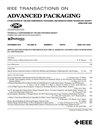A Flexible Time-Stepping Scheme for Hybrid Field-Circuit Simulation Based on the Extended Time-Domain Finite Element Method
引用次数: 17
Abstract
This paper describes a flexible time-stepping scheme for a recently developed hybrid field-circuit solver based on the extended time-domain finite element method (TDFEM) to alleviate the limitation on the use of a system-wide global time-step size. The proposed time-stepping scheme generalizes the strict synchronous coupling mechanism between the FEM and circuit subsystems and allows the signals in the different subsystems to be tracked and sampled at different time-step sizes. The signals from a slow subsystem with a larger time-step size are extrapolated, when necessary, for updating the signals in a fast subsystem with a smaller time-step size. The capability of the hybrid field-circuit solver with the proposed time-stepping scheme is further enhanced by the application of a tree-cotree splitting technique to the FEM subsystem, which helps reduce the iteration count per time step for a preconditioned iterative solution when the time-step size of the FEM subsystem becomes relatively large. With the flexibility of choosing subsystem-specific time-step sizes, the proposed time-stepping scheme improves the computational efficiency of the existing TDFEM-based hybrid field-circuit solver especially when the computational cost associated with the slow subsystems is much higher than that associated with the fast subsystems.基于扩展时域有限元法的混合场路仿真灵活时步方案
本文介绍了一种基于扩展时域有限元法(TDFEM)的混合场路求解器的灵活时间步进方案,以减轻使用全系统全局时间步长的限制。所提出的时间步进方案推广了有限元与电路子系统之间的严格同步耦合机制,并允许在不同的时间步长下对不同子系统中的信号进行跟踪和采样。在必要时,对时间步长较大的慢子系统的信号进行外推,以便更新时间步长较小的快子系统中的信号。将树-共树分割技术应用于有限元分系统,进一步提高了混合场路求解器的求解能力,当有限元分系统的时间步长较大时,减少了预条件迭代解每时间步的迭代次数。该时间步进方案可灵活选择特定子系统的时间步长,提高了现有基于tdfem的混合场路求解器的计算效率,特别是当慢速子系统的计算成本远高于快速子系统的计算成本时。
本文章由计算机程序翻译,如有差异,请以英文原文为准。
求助全文
约1分钟内获得全文
求助全文

 求助内容:
求助内容: 应助结果提醒方式:
应助结果提醒方式:


